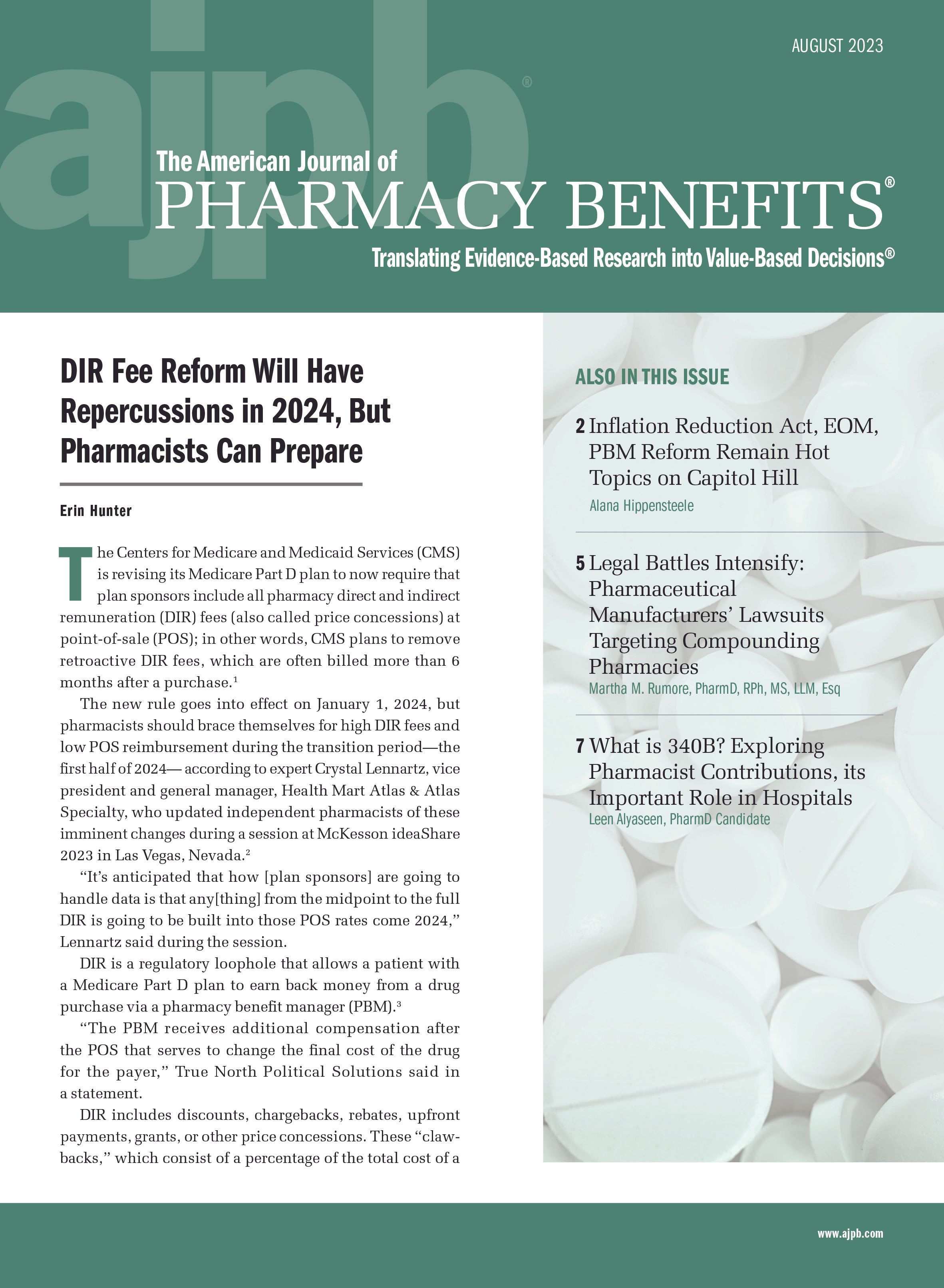Feature
Article
AJPB® Translating Evidence-Based Research Into Value-Based Decisions®
Legal Battles Intensify: Pharmaceutical Manufacturers' Lawsuits Targeting Compounding Pharmacies
Analyzing the patent and trademark challenges faced by 503A compounding pharmacies.
Pharmacy compounding is a fundamental component of pharmacy practice and is essential to the provision of health care. However, for years, pharmaceutical manufacturers have been filing lawsuits against compounding pharmacies, accusing the pharmacies of infringing on their patents.
Image Credit: Kzenon - stock.adobe.com

This rise in legal actions is driven by the growing prevalence of compounding practices over the years, despite the heightened regulatory oversight imposed on 503A compounding at the federal level through the Drug Quality & Security Act (DQSA),1 and at the state level through state boards of pharmacy.
Recent legal actions have specifically targeted pharmacy compounders that fall into the realm of intellectual property. While 503B outsourcing facilities have not been immune from lawsuits by manufacturers, the focus of this article is on 503A compounding pharmacies.
Lawsuits often have claims based on state deceptive and unfair trade practices acts, patent infringement, Lanham Act violations for false statements in product advertisements, and trademark infringement or dilution. Most recently, cases have emerged accusing compounders of selling unapproved new drugs or generic versions in violation of state Food Drug & Cosmetic (FDC) Acts.2 These allegations highlight the evolving legal landscape surrounding compounding pharmacies and the challenges they face in navigating regulatory compliance and intellectual property issues.
What Does Federal Law and State Law Allow?
Drug compounding is often regarded as the process of combining, mixing, or altering ingredients to create a medication tailored to the needs of an individual patient. Compounded drugs are not FDA-approved and do not undergo premarket review for safety, efficacy, or quality.
Sections 503A and 503B of the FDC Act set conditions under which compounded drug products are exempt from certain federal requirements, such as pre-market drug approval.3 In some cases, compounds serve an important role for patients whose medical needs cannot be met by an FDA-approved drug product or where the drug is not available either due to shortages, product discontinuation, or other supply chain issues. According to FDA guidance, compounders are exempt from needing FDA approval for their drugs unless what they are compounding is ”essentially a copy.”4
One of the restrictions of section 503A prohibits compounding products that are essentially copies of commercially available drugs. However, when a drug appears on the FDA’s drug shortages list, some restrictions may be lifted—in particular, restrictions on compounding drugs that are essentially copies of approved drugs.
One reason is that the FDA does not consider a drug to be commercially available when it appears on the FDA’s drug shortages list. If a drug is in shortage, “copies” can be compounded under section 503A provided that the compounding is not done "regularly or in inordinate amounts." All other conditions of section 503A must still be met, including compounding based on a valid prescription for an identified individual patient.
Each state has its own set of Board of Pharmacy rules that apply to 503A compounding pharmacies, resulting in a patchwork of regulations across the 50 states. These pharmacies must be licensed by the state boards, adhere to all pharmacy rules, and compound according to USP <797> (sterile products) and USP <795>. Additionally, they may only compound patient-specific prescriptions and some limited anticipatory compounding prior to receipt of prescriptions.
Basis of Claims of Patent Infringement
The fundamental aim of pharmaceutical patents is to find a balance between providing incentives for innovation and the costs imposed on the public, such as higher prices and lack of competition.5 Patents can claim the chemical compound, i.e., active pharmaceutical ingredient (API), a particular formulation, a method of synthesis or use of the product. Patents grant exclusive rights to manufacture, use, sell, and import the patented product. Additionally, for innovative products, the FDA grants marketing exclusivities upon obtaining regulatory approval.
A patent confers no right to exclude products or processes that do not actually infringe. Claims for patent infringement can only prevail when a 503A is compounding a drug that is “essentially a copy” of a commercially available drug.
Claims of patent infringement for drugs on shortage and hence, not commercially available, will not prevail. FDA guidance on compounding drugs on the FDA shortage list makes no distinction for a patented drug.
If Congress intended to prohibit the compounding of drugs that are covered by a patent, but in shortage, the FDA guidance would have stated that. However, such a prohibition on compounding drugs on patent would not be in accordance with the purpose of permitting compounding of drugs in short supply, which is to ensure patients can continue to access needed and often essential medications despite supply chain issues or disruptions.
Only compounding pharmacies and not their suppliers (i.e., API manufacturers) are exempt from patent infringement. In some of the lawsuits, brand manufacturers claim that generic versions of their products are unapproved new drugs. Since the API is patent-protected, they argue the compounders could not be obtaining API from an FDA-approved manufacturer.
Despite this, API manufacturers are rarely named as defendants in the most recent lawsuits. Generally, lawsuits tend to be filed against the generic drug companies. This may be because patent damages are either calculated as lost profits or reasonable royalty as a percent of infringing sales.
Basis of Claims of Trademark Infringement or Dilution
Any discussion of trademarks, trademark infringement, and unfair competition must begin with the Lanham Act, which defies the term “trademark” and prevents free riding on a trademark owner’s goodwill and reputation.6 Recent cases involving both 503B facilities and 503A compounding pharmacies have invoked the Lanham Act in different ways.
In some recent 503B cases, the Lanham Act analysis has worked in favor of the 503B facilities in which the plaintiffs were unable to show that the compounder, “made any false description or representation of fact.”7 However, many of the recent cases against 503A compounding pharmacies pertaining to compounding of semaglutide involve allegations of trademark infringement,8 use of false designation of origin and unfair competition,9 and false and misleading advertising and promotion.10 Trademarks protect the identification of pharmaceutical products.
The allegations state that compounding pharmacies are “passing off” their unapproved compounded drugs purporting to contain semaglutide as Ozempic or Wegovy, or in some cases, promoting their products as these brand products.11 The allegations are that the compounders are using the brand drug’s name on their advertising and promotion on their website and that when viewed by patients seeking to obtain the brand drug, there is a prominent and misleading use of the trademark. It is further alleged that this leads to consumer confusion in which they think they are purchasing the brand product.
In trademark infringement cases, although there is no way to determine how a court will decide a particular case, even where the use of a trademark is without permission, consent, or authorization, the plaintiffs must prove a likelihood of confusion. Additionally, there are some exceptions to the use of another’s trademark in advertisements.
One of those fair use exceptions is in comparative advertising in which advertisements must be truthful and non-deceptive, and the use of a third party’s trademark must be only for comparison purposes or descriptive and not false or misleading. Additionally, the purpose cannot be merely to associate the compound product with the brand product. Each fair use assessment is highly fact-sensitive, and it is advisable to consult with trademark counsel for review of any comparative advertising.
Unlike trademark infringement, trademark dilution is not based on likelihood of confusion, but rather whether the unauthorized use of the plaintiff’s trademark tarnishes or blurs the trademark.12 Did the use of the plaintiff’s trademark impair the distinctive qualities of the mark? Tarnishment involves an unauthorized use of a mark that links it to low quality products, an assertion common in such cases because of the lack of safety and efficacy, as well as drug approval for compounded products. The burden of proof lies with the plaintiff with both infringement and dilution cases.
Conclusion
Pharmaceutical manufacturers are increasing asserting unfair competition and arguing that compounding pharmacies are acting beyond their authorized purpose when they mimic commercially available drugs. However, courts generally find the FDA’s guidance on 503A to be persuasive authority. Claims for trademark infringement and dilution are fact specific. Because 503A pharmacies know that litigation is extremely costly, the threat of it often acts as an effective deterrent to 503A pharmacies compounding, thereby achieving the manufacturers’ intended goal.
About the Author
Martha M. Rumore, PharmD, Esq., MS, LLM, FAPhA is senior counsel, Frier Levitt, LLC, where her practice focuses on Intellectual Property and Food, Drug & Cosmetic Law.
References
- Pub. L. 113-54. The DQSA comprises two pieces of legislation: The Compounding Quality Act and the Drug Supply Chain Security Act (DSCSA).
- There is no private cause of action under the FDC Act. See Allergan v. Imprimis Pharmaceuticals, Inc. 8:17-cv-01551, U.S. Dist Ct, C. D. CA. May 16, 2019 (where the court found the Lanham Act false advertising claim was an attempt to essentially create a private cause of action to enforce the Federal Food Drug & Cosmetic Act).
- Section 503A(a) (21 U.S.C. 353a(a).
- FDA Guidance for Industry. Compounded Drugs That Are Essentially Copies of a Commercially Available Drug Product Under Section 503A of the Federal Food Drug & Cosmetic Act. CDER. January 2018.
- Sony Corp. of America v. Universal City Studios, Inc., 464 U.S. 417, 429 (1984).
- 15 U.S.C. §§ 1051-1127.
- Azurity Pharmaceuticals, Inc. v. Edge Pharma, LLC, Case No. 21-1492 (1st Cir. Aug. 12, 2022).
- 15 U.S.C. § 1114(1).
- 15 U.S.C. § 1125(a)(1)(A)
- 15 U.S.C. § 1125(a)(1)(B).
- Novo Nordisk v. A/S v. Effinger Health PA Tallahassee Clinic,Case No. 4:23-cv-00265 (D.C. N. D. June 21, 2023).
- Pub. L. 109-312. Trademark Dilution Revision Act. 2006.

Newsletter
Stay informed on drug updates, treatment guidelines, and pharmacy practice trends—subscribe to Pharmacy Times for weekly clinical insights.






